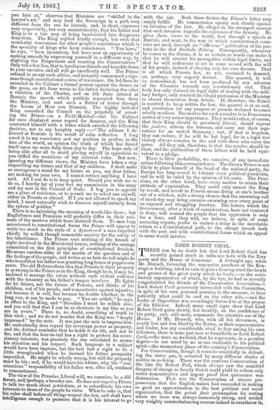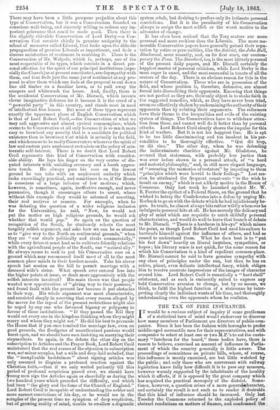LORD ROBERT CECIL. T HERE can be no doubt but that
Lord Robert Cecil has recently gained much in influence both with the Tory party and the House of Commons. A fortnight ago, when Mr. Disraeli, favouring the unpopular purchase of the Ken- sington building, tried in vain to gain a hearing amid the howls and groans of the great party which he leads,—on the satis- factory organization of which, by the bye, he had so recently congratulated his friends of the Conservative Association,— Lord Robert Cecil generously interceded with the Committee, in spite of his own personal aversion to the measure, to hear patiently what could be said on the other side,—and the leader of Opposition was accordingly listened to at the prayer of his follower. Indeed, many small signs show that Lord Robert Cecil gains slowly, but steadily, on the confidence of his party, and, still more, commands the attentive ear of the House. If Mr. Disraeli, who, with all his cleverness, is yearly less and less liked by the Tories, as their representative and leader, has any considerable rival to fear among his own followers, there is none just now so formidable as Lord Robert Cecil,—the more so, we think, that he represents, in a peculiar degree—to our mind by no means creditable to his political spirit—the momentary phase of the country's Conservatism.
For Conservatism, though it consists essentially in defend- ing the status quo, is actuated by many different shades of motive in so doing. There was the cautious Conservatism of the late Sir Robert Peel, which always saw the manifold dangers of change so keenly that it could yield to reform only under demonstrative and urgent proof that quiescence was destruction. That was the Conservatism of sincere pre- possession that the English nation had succeeded in making so good an approximation to the best political and social organization, that the priind facie presumption for resting where we were was always immensely strong, and needed very weighty counterbalancing reasons indeed to overthrow it. There may have been a little pompous prejudice about this type of Conservatism, but it was a Conservatism founded on conscious well-being, and sincerely willing to redress any im- portant grievance that could be made good. Then there is the slightly chivalric Conservatism of Lord Derby—a Con- servatism that consists chiefly in genuine antipathy to the school of measures called Liberal, that looks upon the didactic propagandism of genuine Liberals as impertinent, and feels a sincere satisfaction of sentiment in snubbing it. There is the Conservatism of Mr. Walpole, which is, perhaps, one of the most respectable of its types, which consists in a direct per- sonal affection for the spirit of our principal institutions (espe- cially the Church) as at present constituted, areal sympathy with them, and that feels just the same jar of sentiment at any pro- posal to alter them which one feels at the proposal to cut down fine old timber on a familiar lawn, or to pull away the creepers and whitewash the house. And, finally, there is the accidental Conservatism of Mr. Disraeli, which invents clever imaginative defences for it because it is the creed of a "powerful party" in this country, and stands most in need of intellectual free lances. But none of these types represent exactly the uppermost phase of English Conservatism which is that of Lord Robert Cecil,—the Conservatism of what we may call aggressive and almost cynical commonplace, which seems to be Conservative at all only because it is so much more easy to browbeat any novelty that is a candidate for political existence than to browbeat that which is actually in the field, and which ceases to be really Conservative wherever the spirit of law aud custom puts unpleasant restraints on the policy of aris- tocratic self-interest. There is no doubt that Lord Robert Cecil represents this kind of Conservatism with consider- able ability. He lays his finger on the very centre of dis- puted interests with unfailing accuracy and a harsh aggres- sive touch. He always puts his case on the lowest ground he can take with an unpleasant audacity which looks exceedingly practical, and sometimes is so, if the House is conscious of a large infusion of low motives ; which, however, is sometimes, again, ineffective enough, and never persuasive, though it encourages others to assert, where without this example they would be ashamed of asserting, their real motives or reasons. For example, when he was debating the question of a wider religious inclusion for the Universities, he said, "Now, he would not put the matter on high religious grounds, he would ask whether that would pay." So again on the question of recognition of the South, he studiously selects the most tangibly selfish argument, and asks how we can be so absurd as to "give way to the North on sentimental grounds," when they are "our rivals politically and rivals commercially," while every interest must lead us to cultivate friendly relations with the agricultural people of the South, our "natural ally." He always seems to seek to put his Conservative case on a ground which may recommend itself most of all to the most common-place minds in their hardest moods. Take his clever speech last session on the bill to permit marriage with a deceased wife's sister. What speech ever entered less into the higher points at issue, or dealt more aggressively with the selfish interests involved ? His main thesis was that people wanted new opportunities of "giving way to their passions," and found fault with the present law because it put obstacles in their way. His whole argument was most characteristic, and consisted simply in asserting that every reason alleged by the mover for the repeal of the present restrictions might also be urged by any one who favoured bigamy or polygamy in favour of those institutions. "If they passed the Bill they would set every one in the kingdom thinking whom they might marry and whom they might not." Re did his best to persuade the House that if you once touched the marriage law, even on good grounds, the floodgates of unauthorized passions would burst open, and we should have men insisting on marrying their stepmothers. So again, in the debate the other day on the subscription to Articles and the Prayer Book, Lord Robert Cecil maintained that the real reason of the objection to subscription was, not minor scruples, but a wide and deep -laid unbelief, that the "inexplicable bashfulness" about signing articles was only assumed to disguise a profound reaction against the Christian faith,—that if we only waited patiently 'till this period of profound scepticism passed over, we should have oung men sign the Articles again as cheerfully as during the two hundred years which preceded the difficulty, and which had been "the glory and the fame of the Church of England." Lord Robert Cecil is incapable of understanding the nobler and more earnest convictions of his day, or he would see in the scruples of the present time no symptom of deep scepticism, but of growing reality of mind, unable to swallow a dogmatic system whole, but desiring to profess only its intimate personal convictions. But it is the peculiarity of his Conservatism always to assign the most selfish or the worst motive to the advocates of change.
It has often been noticed that the Tory orators are more personal and more reckless than the Liberals. The more me- morable Conservative papers have generally gained their repu- tation by satire or personalities, like the Satirist, the John Bull, Blackwood, more recently, and, on its first start, our contem- porary the Press. The Standard, too, is the most bitterly personal of the present daily papers, and Mr. Disraeli certainly the happiest master of personal criticism, while Lord Derby is the most eager in onset, and the most successful in taunts of all the orators of the day. There is an obvious reason for this in the nature'of Conservatism. Those who are in possession of the field, and whose position is, therefore, defensive, are almost forced into discrediting their opponents. Knowing that things are not perfect as they are, theironly object is to shake faith in the suggested remedies, which, as they have never been tried, are more effectively shaken by undermining the authority oftheir opponents than by refuting their arguments. The reformers have their theme in the inequalities and evils of the existing system of things. The Conservatives have to withdraw atten- tion from these, and cannot well do it better than by personal attacks. Lord Robert Cecil clearly shares the impulse for this kind of warfare. But it is not his happiest line. He is apt to be too little discriminating and too insolent in his per- sonalities to be thoroughly effective. " Qui dit trop, ne dit rien." The other day, when he was defending the indisariminate charities against Mr. Gladstone, he accused that statesman, with probably less justice than was ever before shown in a personal attack, of "a hard and material philosophy," and, in still more elegant language, of "smearing the memories of testators" by imputing to them "principles which were horrid to their feelings." Last ses- sion he attributed the frequent count-outs "to the wish to insult an enemy," which is not a likely motive in the House of Commons. Only last week he launched against Mr. W. E. Forster the epithet of a Federal Sinon, on the ground that he wished to betray the Confederates into a defeat by urging Mr. Roebuck to go on with the debate which he had injudiciously be- gun. In truth, he almost always hits rather wildly whenever he indulgesin personal hits at all. He has scarcely the delicacy and play of mind which are requisite to catch skilfully personal characteristics, and would do well to leave that branch of debate to hfr. Disraeli. " There is a hardness in his eye" which misses the point, as though Lord Robert Cecil had used his culture to barricade himself against the influence of others, and had so ceased to understand them. What he does best is to "put his foot down" heavily on liberal impailses, sympathies, or hopes ; his literary sense is not quick, for the same reason for which his Conservatism is a kind of repellent common-place. Mr. Disraeli cannot be said to have genuine sympathy with any class of principles under the sun, but then he has an i active pliant, even delicate intellectual fancy, which obliges him t4; receive accurate impressions of the images of character around him. Lord Robert Cecil is essentially a "hard shell" aristocrat, and as such is eminently suited to express any bold Conservative aversion to change, but by no means, we think, to fulfil the highest function of a statesman by inter- preting clearly the indistinct wants of his time, and thoroughly understanding even the opponents whom he confutes.































 Previous page
Previous page